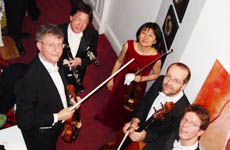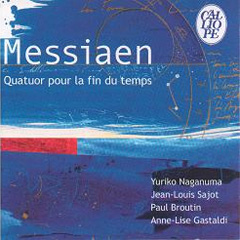Latest news
-
10SEP2012
Intermission at the Rose Garden with a blue sky and mild temperatures accompanied by a pleasant breeze. Summer is finally here. It has been slow. Jean-Louis Sajot the clarinet in the Weber Quintet is quite amazing what partition hard he comes to the end as if it was not. “He who loves well, punishes well.” Weber, in his love for the clarinet, was amused to impose the toughest.
Return paths Bagatelle by candlelight. A delight!
Benjamin Duvshani
-
27JUL2012
Twentieth edition, already for the traditional summer residence of the Octet in France Bagatelle: 8 concerts from July 19, Thursday evening, and Sunday afternoon August 15, offering their customary refreshing cocktail of big names ( Bach, Beethoven, Bruch, Mozart, Rossini, Schubert, Weber) and improbable discoveries (Adolphe Blanc, Georg Friedrich Fuchs, Theodore Gouvy), presented by the great Georges Boyer (unfortunately much favored by the sound). In addition, this year 2012, training founded by clarinetist Jean-Louis Sajot could only devote a tribute to Jean Françaix (1912-1997), not only she had ordered arrangement of Quintet for piano and wind instruments Mozart but she recorded with him in 1996, two discs dedicated to his chamber music, supplemented by a third disc made a few months ago, have been reprinted in a box recently published by Indésens!.
His Octet (1972), written for a set identical to that Schubert was also intended to supplement, is typical of the way between the tireless activism of Roussel and a Martinů, a hand, tenderness and humor of Ravel together the playfulness of Poulenc other. The first movement Andante and leave certainly express the lyricism but the Scherzo, which will be encored at the end of the evening, never seems to stop twirling, a formidable virtuosity by counterpoint and its worked very rhythmic full traps. As for Finale is a delicious old-fashioned waltz evoking a bandstand at the beginning of the last century.
As an appetizer, the strings had given four spruce Third Sonata (1804) Rossini, well served by the acoustics of the orangery and musicians that the final Moderato can be illustrated individually, including the new second violin Guillaume Devin. After the intermission, despite sometimes very spirited peacocks in the gardens, the Octet France returns with one of the favorite works, both in concert disc only, Septet (1800) Beethoven, which achieves a again with great happiness.
Simon Corley
-
25JUL2012
Among the roses, which despite great hopes were so sad to July Octet France remains faithful to his habits and offers a romantic grouping pages of Robert Fuchs, Ludwig van Beethoven and Carl Maria von Weber . A nice break for music lovers in a lot of music and greenery …
Judith Chaine
-
25JUL2012
For the opening of the summer festival Barfleur, Association Des Amis of the church had invited Octet France which was the first service in Normandy. Barfleur can be proud of this privilege to the quality of a directory Designed intreprétations but given little concert (concert for clarinet)
-
Third film, after Gribiche and Carmen, and last collaboration with Jacques Feyder Studio Films Albatros, The New Gentlemen was released in theaters in 1929.
Pulled a piece of street theater by Robert de Flers and Francis Croisset, the script was adapted for the screen by Jacques Feyder and Charles Spaak.
Treaty on the mode of comedy, the film is a critical and satirical political mores of the time. But some scenes, including a fight in the National Assembly and a dream filled with nymphs dancing in the aisles made by a member sitting dormant, were then judged as too irreverent and led to the censorship of the film for “undermining the dignity of Parliamentarians. ”
RestorationThe broadcast on Arte presents the final version of the film, which was scanned from new preservation elements from the original nitrate negative, made in 2011. These elements retain cartons French developed in 1990 by the former head of collections films of the French Cinematheque, Renée Lichtig, who had made a new duplicate from a backup dating from 1961, itself derived from original negative acquired 1948 Henri Langlois. This 2011 version that will be shown for the first time on Arte, contains a fine calibration work and a significant reduction in physical alterations due to printing process by immersion process that did not exist in 1961 when the first backup performed by Henri Langlois.
Musical accompanimentThe released version is presented with musical accompaniment composed and directed by Antonio Coppola. The score was created and performed for the first time by the Octet France during the XXVII edition of the festival Giornate del Cinema Muto in Pordenone October 2008. This is the third collaboration of Antonio Coppola Octet and France for a film of Jacques Feyder, they have accompanied Crainquebille (1922) and Faces of Children (1925).
-
22MAY2012
- September 2012 (1)
- July 2012 (3)
- June 2012 (1)
- May 2012 (1)
 English
English Français
Français















